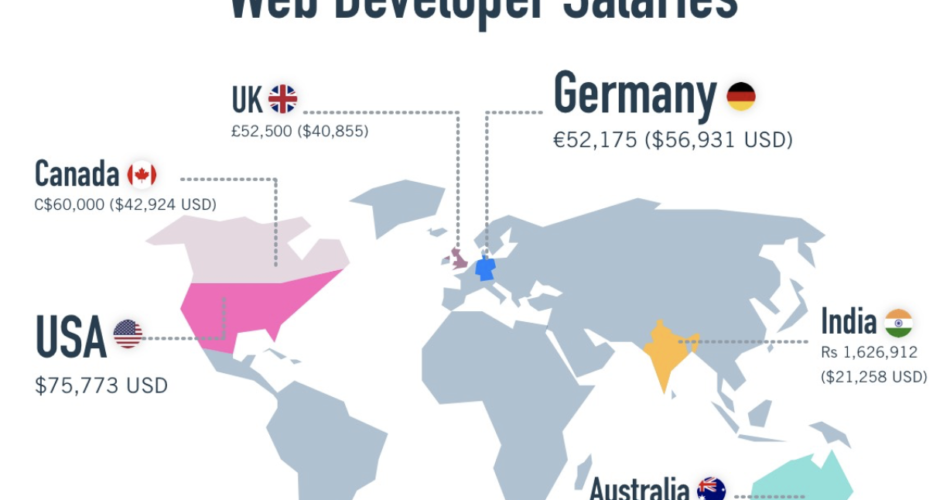Web development has become one of the most sought-after careers in the digital age. With the increasing demand for websites and online applications, the need for skilled web developers has skyrocketed. However, many aspiring web developers are often left wondering about the salary prospects in this field. In this article, we will delve into the world of web developer salaries and explore the factors that influence them.

Web Developer Salary
Factors that influence web developer salary
Several factors come into play when determining a web developer’s salary. The first and foremost factor is the level of experience. As with any profession, more experienced web developers tend to command higher salaries. A web developer with a few years of experience under their belt will likely earn more than a fresh graduate.
Another crucial element is the location. Web developer salaries can vary significantly depending on where you work. For instance, web developers in major tech hubs such as Silicon Valley or New York City generally earn higher salaries compared to those working in smaller cities or rural areas.
The industry in which a web developer works also plays a significant role in salary determination. Web developers employed in sectors such as finance, healthcare, or e-commerce often earn higher salaries due to the complexity and importance of the projects they handle.
Average web developer salary
The average web developer salary can provide a good starting point for understanding the earning potential in this field. According to recent industry reports, the average salary for web developers in the United States is around $75,000 per year. However, it is important to note that this figure can vary based on the factors mentioned earlier.
It is worth mentioning that the average web developer salary is not a stagnant number. As the industry evolves and new technologies emerge, the demand for specialized skills increases, leading to higher salaries for those who possess them. Therefore, staying up-to-date with the latest trends and continuously improving your skillset can contribute to a higher salary as a web developer.
Web developer salary by location
As mentioned earlier, the location where a web developer works greatly affects their earning potential. Let’s take a closer look at how web developer salaries vary across different regions.
In major tech hubs such as San Francisco and New York City, web developers can earn significantly higher salaries compared to the national average. The high cost of living in these areas often translates into higher compensation packages for web developers. On the other hand, web developers in smaller cities or rural areas may earn slightly lower salaries due to the lower cost of living.
Furthermore, considering international opportunities can also be advantageous for web developers. Countries such as Canada, Germany, and Australia offer competitive salaries for skilled web developers, making them attractive destinations for those seeking higher earning potential.
Web developer salary by experience level
Experience plays a vital role in determining a web developer’s salary. Entry-level web developers typically earn less than their more experienced counterparts. As one gains experience and builds a solid portfolio of work, their earning potential increases.
Fresh graduates entering the web development field can expect to earn an average salary of around $50,000 per year. However, with a few years of experience, this figure can rise to $75,000 or more. Senior web developers with extensive experience and expertise can earn well over $100,000 annually.
It is important to note that experience alone is not the sole determinant of salary. Continuous learning, staying updated with the latest technologies, and acquiring specialized skills can significantly boost a web developer’s earning potential.
Web developer salary by industry
Different industries offer varying salary ranges for web developers. Let’s explore how salaries differ across some key sectors.
In the finance industry, web developers often work on complex systems and applications that require high levels of security and reliability. As a result, web developers in the finance sector tend to earn higher salaries compared to other industries.
The healthcare industry is another sector where web developers can earn competitive salaries. With the increasing digitization of medical records and the development of healthcare applications, there is a growing demand for skilled web developers in this field.
E-commerce is yet another industry that offers attractive salary prospects for web developers. As online shopping continues to gain popularity, companies are investing heavily in their web presence, resulting in higher demand for web development professionals.
Web developer salary comparison – front-end vs. back-end
Within the web development field, there are two primary areas of specialization: front-end and back-end development. Let’s compare the salaries for these two roles.
Front-end developers are responsible for creating the user-facing aspects of a website or application. They work with HTML, CSS, and JavaScript to design and implement the visual elements. On average, front-end developers earn a salary in the range of $60,000 to $90,000 per year.
Back-end developers, on the other hand, focus on the server-side functionality and database management. They work with programming languages such as Python, Ruby, or PHP. Back-end developers tend to earn slightly higher salaries, ranging from $70,000 to $100,000 per year.
It is important to note that these figures are averages and can vary depending on factors such as experience, location, and industry.
Tips for negotiating a higher web developer salary
Negotiating a higher web developer salary requires preparation and confidence. Here are a few tips to help you maximize your earning potential:
- Research industry standards: Familiarize yourself with the average salaries for web developers in your area and industry. This knowledge will provide a solid foundation for negotiation.
- Highlight your accomplishments: During salary discussions, emphasize your relevant skills and accomplishments. Showcase your successful projects and any additional certifications or qualifications you possess.
- Demonstrate your value: Clearly articulate the value you bring to the organization. Highlight how your expertise can contribute to the company’s success and growth.
- Be flexible: While aiming for a higher salary, be open to negotiating other benefits such as additional vacation days, remote work options, or professional development opportunities.
Resources for finding web developer salary information
If you are looking for more comprehensive and up-to-date information on web developer salaries, consider exploring the following resources:
- Salary websites: Websites like Glassdoor, PayScale, and Indeed provide salary data specific to web developers. These platforms allow you to search for salaries by location, experience level, and industry.
- Professional communities: Joining web development communities and forums can provide valuable insights into salary trends and industry standards. Engaging with experienced professionals can help you understand the market better.
- Industry reports and surveys: Keep an eye out for industry reports and surveys that focus on web developer salaries. These publications often provide comprehensive data and analysis on salary trends in the field.
Conclusion
Understanding the intricacies of web developer salaries is essential for aspiring and current professionals in the field. Factors such as experience, location, industry, and specialization all play a significant role in determining a web developer’s earning potential. By staying informed about industry trends, continuously improving skills, and effectively negotiating, web developers can unlock higher salaries and build a successful career in this exciting field.
Call to Action: If you’re a web developer looking to maximize your earning potential, start by researching salaries in your area and industry. Consider joining professional communities and leveraging online resources to stay up-to-date with salary trends and negotiation strategies.

